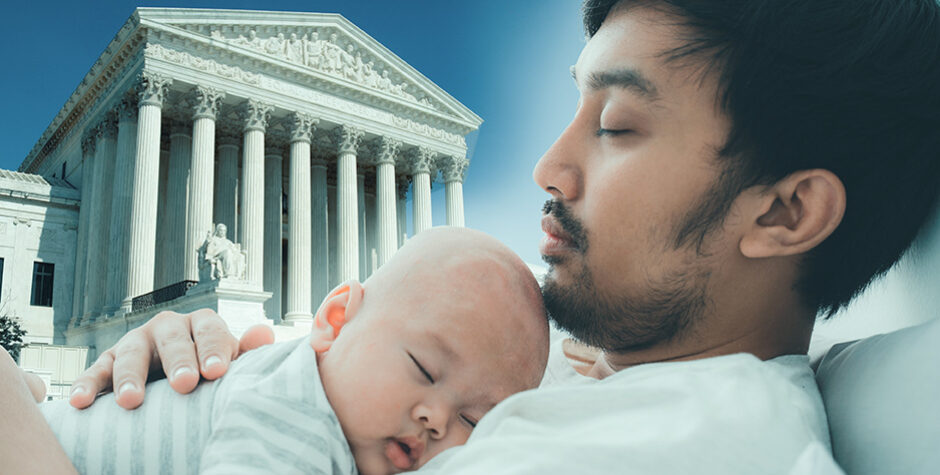The ACLJ Files Supreme Court Amicus Brief on Behalf of the ECLJ in Dobbs v. Jackson Women's Health Organization – Standing for the Rights of the Unborn
No issue, other than slavery, has divided our nation more than abortion. On one side of the debate, there are people and groups like the ACLJ who believe in the biblical principle that life is sacred and that unborn children are entitled to the fundamental rights of life and liberty. On the other side of the debate are those who embrace the 1973 United States Supreme Court’s erroneous and radical decision in Roe v. Wade, which literally fabricated a right to abortion that does not exist in the U.S. Constitution. Although the “right” to abortion has continued to be a debated topic since 1973, this is the first time that the Supreme Court has been specifically asked to overturn Roe v. Wade.
The case is Dobbs v. Jackson Women’s Health Organization, which we have discussed before here and here. It involves a Mississippi law that bans abortion after 15 weeks. As the parties are filing briefs in this case, we have prepared and filed an amicus brief on behalf of the European Centre for Law and Justice (ECLJ). Our brief is a summary of how the European Court of Human Rights (European Court) and the European Convention of Human Rights (ECHR) deal with abortion in light of competing rights, as well as address abortion legislation in the 47 Member States of the Council of Europe (States). We note what may surprise many: European law is far more protective of life and restrictive of abortion than Roe and its subsequent Supreme Court precedents have allowed in the U.S. Our brief states:
The purpose of this amicus brief is to offer this Court a precise description of the legal standing of abortion within the case law of the European Court, including the abortion legislation currently in force in the forty–seven Member States of the Council of Europe (States), especially in regard to gestational limits.
Regarding the caselaw of the European Court, on the whole, the European Court does not exclude in principle the unborn child from the scope of application of the European Convention of Human Rights (ECHR), especially from the right to life, and does not find in the ECHR any ground for a conventional right to abortion. Therefore, the ECHR does not contain, nor guarantee, any right of access to abortion.
However, the European Court allows States, within their margin of appreciation, to decide when the right to life begins, and consequently, to permit abortion. But if a state permits abortion, its legal framework must then respect the competing rights and interests of the unborn child, the child’s parents and the society, guaranteed by the ECHR.
Regarding the comparative law in Europe, thirteen States prohibit abortion on demand entirely, and only authorize abortion in exceptional cases (e.g., rape of the mother, risk to the mother’s life, etc.). In the States where abortion on demand is legal, eight States permit it only through the first ten weeks of pregnancy, Estonia through eleven weeks, and a further twenty States through twelve weeks. Thus, of the thirty-four States that permit limited abortion on demand, twenty-nine (85% of them) only permit it within the first twelve weeks of pregnancy. Those States, coupled with the thirteen States that prohibit abortion, account for a vast majority (89%) of all States. Five other States allow abortion on demand in later stages. It is permitted through the first fourteen weeks in Spain and Romania, through eighteen weeks in Sweden, through twenty-two weeks in Iceland, and through twenty-four weeks in the Netherlands.
Only under exceptional circumstances, such as in the case of fatal or serious malformation of the unborn child, pregnancy resulting from rape, and pregnancy that endangers the health of the pregnant woman do the majority of States allow abortion to be performed after the legal deadline has passed. However, ten of those States still prohibit even exceptional abortions from being performed after twenty–four weeks of pregnancy.
We point out that there is no conventional right to abortion, that the ECHR has never excluded unborn children from the scope of the ECHR, that abortion cannot be a fundamental right, and that in fact, there is an international duty to prevent abortion. We further discuss that under the European Court and the ECHR, if a State does legalize abortion, the State must respect the competing rights and interests of the unborn child that are guaranteed by the ECHR. We point out to the Supreme Court the harms of abortion and ask the Court to reverse the lower court judgment.
The ECHR, as consistently interpreted by the European Court, does not provide for a right to abortion. If, however, limited abortion is allowed in a State, its legal framework must respect the competing rights and interests guaranteed by the ECHR. These competing rights and interests, as well as the States’ international duty to reduce recourse to abortion, are best respected when the life of the unborn baby is rightfully acknowledged and afforded just protection, and the legal time limit for abortion is restricted accordingly.
This Honorable Court should reverse the judgment of the court below.
We are hopeful the Supreme Court of the United States will follow the Constitution, finally correct the flawed opinion of Roe, acknowledge the right to life of the unborn child, and reverse the lower court’s judgment.
Our brief filed today on behalf of the ECLJ is the first of three amicus briefs we are filing at the Supreme Court in this case, including on behalf of a prominent pro-life medical research institute and on behalf of the ACLJ and our members, which we will discuss in future posts.
